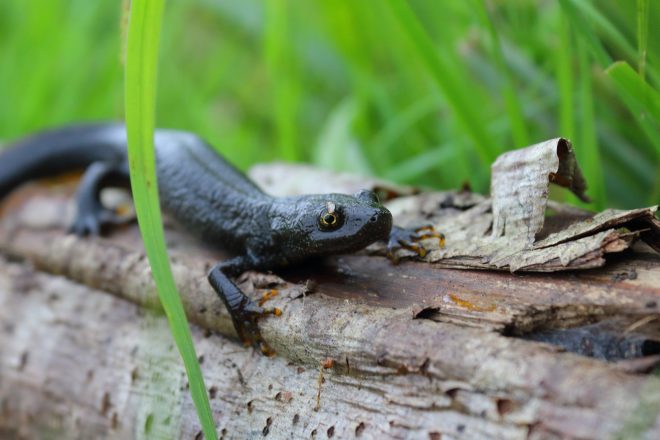Every day is a newt day! New licensing scheme in South Downs to help protect amphibians
August 16, 2023

Great crested newts are the biggest newt species in the UK and have been around for much longer than humans – a staggering 40 million years. But these pond-loving amphibians are in trouble across the country, with populations on the decline despite strong legal protection.
Now a new licensing scheme aims to give further protection to the creatures to help them thrive, streamlining paperwork for developers and using licence fees to pay for much-needed conservation work. It comes as the National Park Authority has been working with nearby local planning authorities, as well as NatureSpace Partnership and Natural England, on the licensing programme.
 Kate Stuart, Planning Policy Lead, explained: “Great crested newts are protected under UK law which makes it illegal to harm or move them, or damage their habitat, unless a Licence is in place.
Kate Stuart, Planning Policy Lead, explained: “Great crested newts are protected under UK law which makes it illegal to harm or move them, or damage their habitat, unless a Licence is in place.
“Previously the whole process of getting a Licence could potentially be very long-winded.
“This new District Level scheme provides a quick and efficient process for applicants, and delivers long-term, landscape-scale nature recovery.”
So how does the scheme work? NatureSpace will first assess the development sites to determine the potential impact to great crested newts using their Natural England-approved metric. This assessment is informed by ‘Impact Risk Maps’, which have been modelled to predict newt presence through habitat suitability and allows developers to check whether their site is likely to impact great crested newts.
Applicants are provided with a certificate that they can submit alongside their planning application, proving that they have compensated towards great crested newt conservation. Once planning permission is granted, the development can go ahead under the National Park’s Licence and if newts are found they can be moved to a safe location.
The fees applicants pay for the certificate are used to deliver conservation work off-site, which is carried out by the Newt Conservation Partnership, Amphibian and Reptile Conservation and Freshwater Habitats Trust. Fees are proportionate and are calculated based on the potential impact of the proposals.
Use of the scheme is optional for anyone submitting planning applications for development. Applicants have the option of utilising the District Licensing route or to continue to apply to Natural England in the usual way for a Standard Licence.
NatureSpace CEO, Dr Tom Tew said: “We are delighted to see our District Licensing Scheme expand across the South Downs National Park Authority, making our scheme accessible to even more people, benefitting even more newts.
“Our streamlined approach offers a year-round option and a risk-free solution for developers of all sizes and types. Through the scheme, developers can speed up their delivery, avoid survey season restrictions, ensure legal certainty, and futureproof mitigation costs. In return, compensatory habitats are created in optimum locations for newts, away from the pressures of development. Our nature conservation expert partners create, manage, and monitor these aquatic and terrestrial habitats long-term, guaranteeing a sustainable future for newts.
“We look forward to continuing our work with the South Downs National Park Authority planners and ecologists.”
